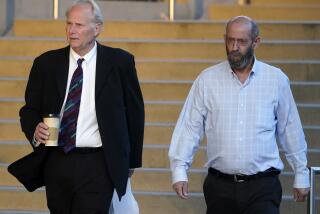Kinkaid Skipper Slept While Ship Entered Busy Straits, Admiral Says : Collision: Captain didn’t ask to be awakened before ship entered straits, court-martial told.
- Share via
Cmdr. John Cochrane, skipper of the destroyer Kinkaid that collided with a merchant vessel by the Straits of Malacca, knew his vessel would reach the busy channel the morning of the crash at 5 but asked for a wake-up call an hour later, an admiral testified Monday during court-martial proceedings.
In a statement made within 48 hours of the accident and later retracted, Cochrane told investigators the Kinkaid’s navigator had informed him the vessel would reach the straits at 5 a.m,. but Cochrane made no mention of it in his night orders to a skeleton watch crew, said Rear Adm. Geoffrey Lynn Chesbrough, commander of the Naval Surface Group, Western Pacific.
Chesbrough was assigned to investigate the Kinkaid crash last November and reached the vessel hours after its collision with a merchant ship that killed one crew member and injured 17.
In his investigation, Chesbrough concluded that the Kinkaid was ill-prepared to enter the world’s busiest channel because its captain had not alerted the inexperienced crew in advance, nor posted experienced men as lookouts, nor scheduled a briefing to discuss what sorts of navigational marks the crew would be seeing.
“This was a failure of one ship and a number of people on one ship,” said Chesbrough, after testifying during the sixth day of proceedings. “You are going to find some things wrong on almost every single ship, but we build in safeguards. What you saw this night was the failure of every single safeguard.”
To prove that Cochrane was derelict in his duties, the Navy prosecutor must show Cochrane’s actions or inactions were criminally negligent and led to the collision. But Cochrane’s attorneys, who launched their defense Monday, say the skipper was unaware of what was going on aboard the Kinkaid because the duty officer neglected to call him.
Cochrane, who told The Times on Monday that he had gone through the busy straits twice before the collision, has been in the Navy almost 21 years. He was slated to be promoted this August.
But, if found guilty, he faces a maximum penalty of dismissal from the Navy, two years in the brig and forfeiture of all future pay, including his pension.
In a surprise move during the hearing, Cochrane’s attorney, Lt. Tom Courtney, said the skipper would take the stand today and clarify why he had told the admiral that he knew the Kinkaid would arrive in the early morning. But Courtney also said Cochrane didn’t really know when the ship would arrive. Courtney said the confusion would be cleared when Cochrane takes the stand.
Much of the case hinges on what Cochrane, 44, knew about the ship’s location, when he knew it and whether he should have been better informed.
Like every Navy captain, Cochrane had issued standing orders that he should be called for any sightings of close-passing vessels or changes in course and speed. But, during the early morning hours of the crash, the ship’s duty officer, Lt. (j.g.) Steven Williams changed course more than four times, including one change of more than 45 degrees. Williams, who received a punitive letter of reprimand in February, never phoned Cochrane who was asleep in his room, Williams testified.
Unable to figure out the Kinkaid’s location, Williams ordered a number of course changes, including one that put the vessel on the wrong side of the shipping channel.
“Responsibility, authority, and accountability are the building blocks of military leadership,” Courtney said during his opening statement. “Clearly, without doubt the commanding officer is ultimately responsible and ultimately accountable. The question here is the degree of accountability.”
Courtney devoted Monday afternoon to calling witnesses who testified that Cochrane had sought to run a well-prepared ship.
“Is he (Cochrane) accountable? Yes,” Courtney said. “Is he criminally liable? Clearly, the answer is ‘no.’ ”
More to Read
Sign up for Essential California
The most important California stories and recommendations in your inbox every morning.
You may occasionally receive promotional content from the Los Angeles Times.












